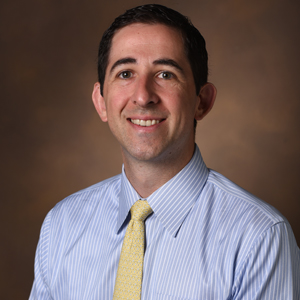With childhood-cancer cure rates rising, pediatric hematologists and oncologists face more challenges at the threshold between treatments and risks of dangerous sequalae.
Daniel J. Benedetti, M.D., a pediatric hematologist and oncologist at Monroe Carell Jr. Children’s Hospital at Vanderbilt, treats children who have solid tumors and other cancers, and he has further expertise in bioethics.
In our interview, Benedetti shares his concerns about the trade-offs between a more certain acute cure and potential long-term health risks, the nuances of family informed consent, and his hopes for what the emerging subspecialty of bioethics may bring to the decision-making.
Discoveries in Medicine: Would you touch on the landscape of pediatric cancer treatment today and why these trade-offs are becoming increasingly challenging?
Benedetti: Let me start by pointing to the remarkable success that has been achieved in curing childhood cancer. While there are wide variations among cancers, we have about an 85-percent cure rate today, overall. That progress came on the back of decades of serial clinical trials to refine the treatment for each specific cancer type utilizing the three standard treatments: chemotherapy, surgery and radiation.
“We’ve learned about chronic treatment-driven conditions from decades of children surviving childhood cancer.”
We now better understand the benefits and risks of these therapies, but we still need to figure out how to improve outcomes for the children who are not cured by the initial, best-known therapy. Then, we also have to figure out how to reduce the long-term effects for our survivors, because we’ve learned about chronic treatment-driven conditions from decades of children surviving childhood cancer.
Now we are learning to incorporate novel agents like immunotherapy or other targeted medicines. For all their plusses, they add to the complexity of the decision matrix.
Discoveries: What, specifically, are some of the ethical dilemmas involved in these novel therapies?
Benedetti: Because childhood cancer is still rare, research can be a very slow process in pediatric oncology. This leaves oncologists with trade-offs to consider. if you have a child with a cancer diagnosis and the cure rate overall is 90 percent, we might ask, and we should ask, do we think we can reduce the therapy by omitting something, adding something else in or in some other way changing up the treatment mix? And what’s the risk level we are willing to accept – are we willing to go down to an 85-percent predicted cure rate to avoid late effects?
And the next and very challenging part of this is, how do we ensure that families understand these trade-offs?
Realities of Informed Consent
Discoveries: In one of your editorials, you write about how difficult it is to know when families are making fully informed decisions. How would you characterize this problem?
Benedetti: We have this ideal of informed consent, where families would receive and process information and make a rational choice based on their values and priorities. Yet the stress, emotions and worries of a parent whose child was just diagnosed with cancer make it unlikely that the textbook version of informed consent can occur. So, we have to meet our families where they are, helping them make an adequately informed decision. In a sense, we are asking the family to make an unthinkable decision and in a very short time frame.
Families can look you in the eye and say they understand what it means to be in a trial – that we are trying to find out if treatment ‘A’ works better than treatment ‘B’ or than a placebo, or if it works at all. But at the same time, parents will report they are enrolling to benefit their child.
Discoveries: How do you then manage these families’ expectations and advise them?
We have obligations to ensure that they’ve received enough information, in language they can understand, and that they seem to have adequate understanding of what they are agreeing to. I’ve used the word adequate again, because most of us are skeptical that ideal informed consent can occur in this setting.
New Therapies Bring Challenges
Discoveries: What are some examples of how you are incorporating newer therapies and approaches into your recommendations?
Benedetti: I am currently caring for a child who had cancer and a number of comorbid health conditions. I worried that giving him the standard four-drug chemotherapy regimen was going to pose significantly increased risk to him. There is data that for many cancers like his, all four drugs are not necessary. So, I recommended a hybrid, where we started with two cycles of the four drugs, and when he got a good enough response and I felt optimistic that he didn’t need the most intense treatment, we reduced and removed some of the other drugs. He was able to be cured with this tailored approach.
Another example of tailoring our treatment involves patients with genetic cancer predisposition syndromes. We want to be mindful of the fact that while we may cure them of their first cancer, they may go on to develop another cancer in a different place or of a different type. But we also can’t forget that we need to cure them of this cancer before worrying too much about a second cancer. It is rarely straightforward decision-making.
Discoveries: What other challenges do novel and hybrid therapies present?
Benedetti: Our field is grappling with when to use CAR-T therapy for B-cell acute lymphoblastic leukemia (B-ALL). Initially studied in multiply relapsed patients, it was incredibly effective for these patients, who lack other effective options.
Do we bring it to the setting upfront? Or do we save it for when the child has relapsed after two to three years of chemotherapy and therefore has already been exposed to the many risks of chemotherapy?
It will take decades before we know as much about the long-term effects of CAR-T drugs as we do about common chemotherapies. Once we do, there will always be more new ones we know less about.
There is a lot of information and uncertainty for the clinicians to consider and communicate to the families, and a lot for the families to digest when asked to give informed consent for treatments or trials.
Bioethicists Provide Vital Support
Discoveries: This gets to your work as a proponent of collaborating bioethicists in pediatric hematology/oncology (PHO). How do you characterize this role?
Benedetti: Having dedicated PHO bioethicists can help address the ethical issues we encounter in both clinical and research practices.
The bioethicist’s position can be as a freestanding professional or as an adjunct to an M.D. or other doctoral or master’s level professional through certification. They may focus on clinical ethics by performing ethics consultations, engage in preventative ethics, or address moral and emotional distress of all the stakeholders in the care of children with cancer and blood disorders. Their role is fundamentally to help our patients receive the optimal care in the ever-changing landscape of a field that continually integrates research into clinical practice.
Discoveries: What are you doing to further the development of this subspecialty?
Benedetti: Today, there are only a handful of PHO bioethicists in the country. We’re proposing the creation of a special interest group within the American Society of Pediatric Hematology/Oncology to bring ethics-interested colleagues together and grow the PHO field.
“As researchers and clinicians continue to push forward with novel diagnostics and therapeutics, bioethicists will play a growing role.”
We are also recommending the formation of a task force of PHOs to develop improved ethics content specifications and core competencies for subspecialists to get through PHO training programs.
As researchers and clinicians continue to push forward with novel diagnostics and therapeutics, bioethicists will play a growing role in examining and integrating these advancements for the betterment of all stakeholders.






